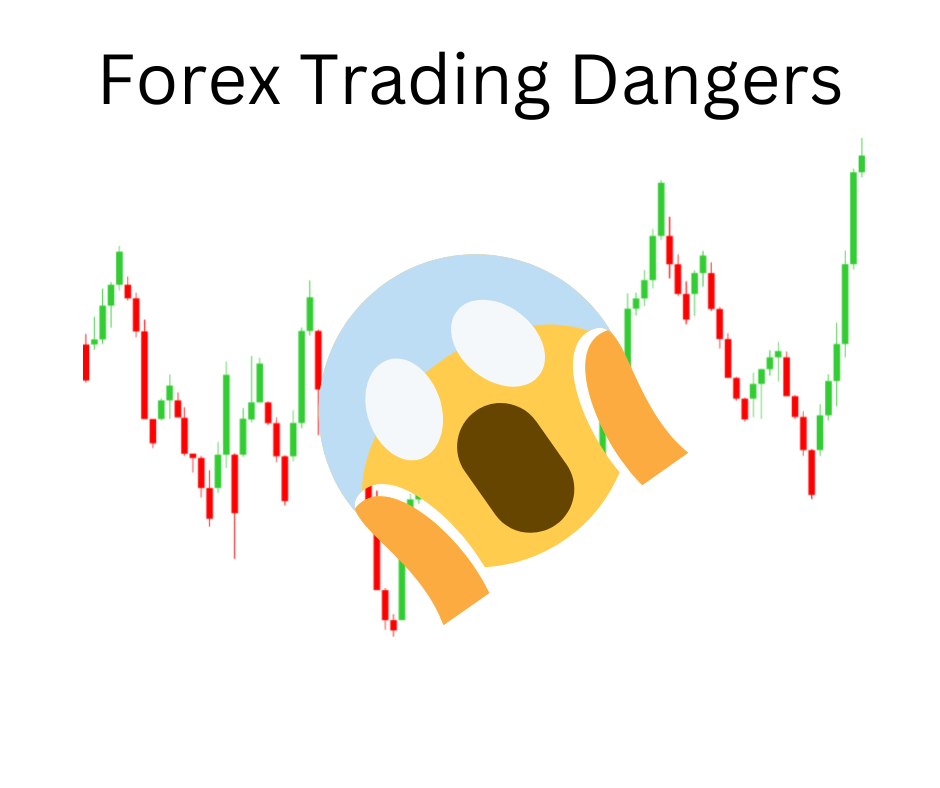If you’re looking for a way to make some extra cash, forex trading might seem like an enticing option. After all, with the right strategy, you can potentially make a lot of money in a short amount of time.
But while forex trading can be profitable, it’s also incredibly risky. In this article, we’ll explore some of the dangers and risks of forex trading, and what you can do to protect yourself.

What is Forex Trading?
Forex, or foreign exchange, trading involves buying and selling currencies to make a profit. For example, if you believe that the value of the Euro will rise compared to the US dollar, you might buy Euros with your dollars. If the Euro rises, you can sell your Euros back for more dollars than you originally spent, making a profit.
Forex trading is a global market that’s open 24 hours a day, five days a week. It’s the largest financial market in the world, with trillions of dollars traded every day in foreign currencies. While forex trading was once the domain of banks and financial institutions, it’s now accessible to anyone with an internet connection and some cash to spare.
The Dangers of Forex Trading
While forex trading can be profitable, it’s also incredibly risky. Here are some of the dangers you should be aware of:
1. High Volatility
Forex markets can be extremely volatile, with prices fluctuating rapidly and exchange rates move unpredictably. This volatility can lead to big profits, but it can also lead to big losses. If you’re not prepared to deal with this volatility, forex trading might not be for you.
2. Leverage
Leverage is a powerful tool to help you make larger trades with less money. With leverage, you’re essentially borrowing money from your broker to increase your trading power. While this can lead to bigger profits, it can also magnify your losses.
It’s important to understand how leverage works and to use it responsibly. Most brokers offer different levels of leverage, and the amount you can use will depend on your account balance and other factors. While it can be tempting to use the maximum amount of leverage available, this can be a dangerous strategy.
When using leverage, it’s important to clearly understand the risks involved. You should always use stop-loss orders to limit your potential losses and protect your account from excessive drawdowns.
It’s also good to start small and gradually increase your position sizes as you gain experience and confidence.
Another important consideration when using leverage is margin requirements. Your broker will require you to have a certain amount of funds in your account as collateral to cover potential losses. If your losses exceed your margin, your broker may issue a margin call, which means you’ll need to deposit more funds or close out your positions.
3. Scams
Scams are an all-too-common danger in the forex trading industry. Dishonest brokers may try to lure you in with promises of guaranteed profits or use high-pressure tactics to convince you to invest more money than you’re comfortable with.
It’s important to remember that there are no guarantees when it comes to trading, and any broker who claims otherwise is likely not being truthful.
Another risk is that some brokers may not be licensed or regulated, meaning they could disappear with your money at anytime.
To avoid falling victim to scams, it’s crucial to do your due diligence and thoroughly research any broker or trading platform before investing your money.
One way to protect yourself is to work with a broker who is licensed and regulated by a reputable authority, such as the Financial Conduct Authority (FCA) in the UK or the National Futures Association (NFA) in the US. These regulatory bodies set standards for brokers to follow and can help ensure that your funds are protected.
Another red flag to watch out for is brokers who offer unrealistic bonuses or incentives. These offers may be too good to be true and could be a sign of a scam. Additionally, be wary of brokers who pressure you to invest more money than you’re comfortable with or who refuse to provide you with clear information about their fees and charges.
4. Lack of Regulation
Forex trading is largely unregulated, meaning there’s no governing body to oversee the industry. While there are some reputable brokers out there, it’s important to do your research before investing your money in foreign exchange trades.
5. Emotional Trading
Emotional trading is one of the biggest dangers in forex trading. It’s natural to feel excited when you’re making money or frustrated when you’re losing, but letting your emotions dictate your trading decisions can be a recipe for disaster.
The key to avoiding emotional trading is to have a clear trading plan and stick to it. This means setting specific goals for your trades, identifying entry and exit points, and using stop-loss orders to limit potential losses.
It’s also important to have realistic expectations and to avoid getting caught up in the hype of big profits. Remember that forex trading is a long-term game, and success is measured over weeks, months, and even years, not just a single trade.
If you find yourself getting emotional or making impulsive trades, take a step back and reevaluate your strategy. It may be helpful to take a break from trading and clear your head, or to seek the advice of a professional trader or mentor.
How to Protect Yourself
While there are dangers involved in forex trading, there are also steps you can take to protect yourself:
1. Do Your Research
Before investing any money, make sure you do your research. Look for a reputable broker who’s licensed and regulated. Read reviews and talk to other traders to get an idea of what to expect.
2. Start Small
Don’t invest more money than you can afford to lose. Start small and gradually build up your investment as you become more comfortable with the market.
3. Have a Strategy
Don’t just make trades on a whim. Have a strategy in place and stick to it. This will help you avoid emotional trading and make more informed decisions.
4. Use Stop-Loss Orders
A stop-loss order is an order to sell a currency if it drops below a certain price. This can help limit your losses if the market goes against your trade.
5. Practice with a Demo Account
Many brokers offer demo accounts that allow you to practice trading without risking any real money. This can be a great way to get a feel for the market and test out different strategies before investing your own cash.
6. Stay Informed
Staying informed is a crucial part of successful forex trading. The currency markets can be highly volatile and can quickly react to news and events from around the world. As a trader, it’s important to stay on top of these developments to make informed decisions about your trades.
One way to stay informed is to follow reputable news sources that cover the financial markets. This can include newspapers, websites, and financial news channels. By keeping up with the latest news, you can gain valuable insights into what’s happening in the markets and how it may affect the currencies you’re trading.
You should also pay attention to economic indicators, such as GDP growth, employment rates, and inflation. These indicators can provide clues about the health of a country’s economy and can impact the value of its currency and exchange rate.
Another way to stay informed is to use trading tools that can help you monitor the markets in real-time. These tools can include charting software, trading signals, and news feeds. By using these tools, you can stay up-to-date on market developments and make informed decisions about when to enter or exit trades.
7. Be Prepared to Cut Your Losses
If a trade isn’t going your way, be prepared to cut your losses and move on. Don’t hold onto a losing trade in the hopes that the market will turn around. This can lead to even bigger losses.
8. Keep Your Emotions in Check
As we mentioned earlier, emotional trading can be a major danger in forex trading. Try to stay calm and objective, even when the foreign exchange market is fluctuating wildly. If you find yourself getting too emotional, take a break and step away from your computer.
9. Consider Working with a Professional
If you’re new to forex trading or don’t feel confident managing your own investments, consider working with a professional. A financial advisor or forex trading coach can provide guidance and help you make more informed decisions.
More: How to quit forex trading
Conclusion
In conclusion, forex trading can be a thrilling and potentially profitable endeavor, but it’s important to approach it with caution and a well-informed strategy. As we’ve discussed, there are several dangers to watch out for, including high interest rates, volatility, leverage, scams, lack of regulation, and emotional trading.
To protect yourself, it’s crucial to start small and invest only what you can afford to lose. Always have a clear strategy in place and use stop-loss orders to limit your losses. Practicing with a demo account and staying informed about market news and events can also help you make better decisions.
Most importantly, keep your emotions in check and be prepared to cut your losses if a trade isn’t going your way. Remember that forex trading is a high-risk activity, and there are no guarantees of success. However, by following these tips and considering working with a professional, you can improve your chances of success and avoid some of the common pitfalls of forex trading.
Ultimately, whether or not forex trading is right for you will depend on your individual goals, risk tolerance, and financial situation. By weighing the potential rewards against the risks and taking a thoughtful, strategic approach, you can make the best decision for your own unique circumstances.
FAQs
Is forex trading illegal?
No, forex trading is legal in most countries. However, it’s important to research the regulations in your specific country before investing any money.
How much money do I need to start forex trading?
The amount of money you’ll need to start trading will depend on your broker and your strategy. Some brokers allow you to start with as little as $50, while others require a minimum investment of several thousand dollars.
Can I make a lot of money with forex trading?
Yes, it’s possible to make a lot of money with forex trading. However, it’s also possible to lose a lot of money. It’s important to have a strategy in place and to manage your risk carefully.
Can I trade forex 24 hours a day?
Yes, the forex market is open 24 hours a day, five days a week.
Should I quit my day job to become a full-time forex trader?
No, quitting your day job to become a full-time forex trader is generally not a good idea. Forex trading can be a volatile and unpredictable market, and it’s important to have a stable source of income while you’re getting started.
